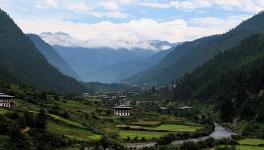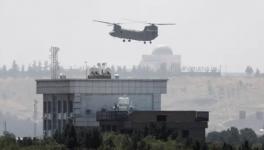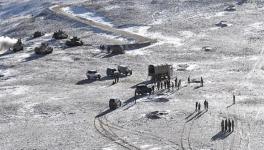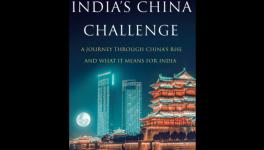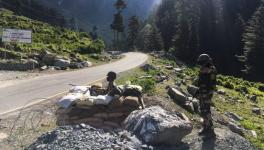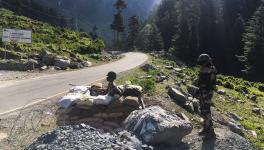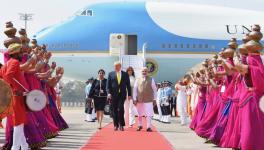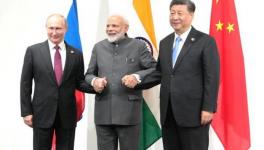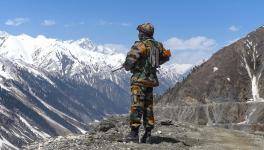Sino-Indian Clash Shows Intelligence Agencies in Poor Light
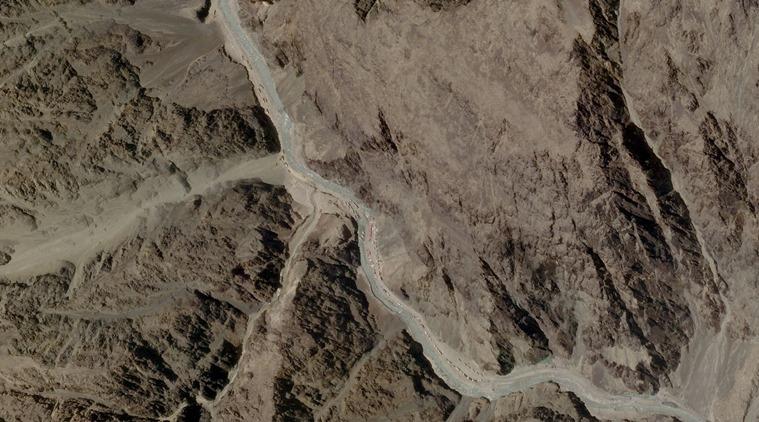
Satellite image of Galwan Valley. | Image Courtesy: Indian Express
Even as India and China disengage and de-escalate from the situation in the Himalayan slopes of Ladakh, it is useful to examine the role of the Indian intelligence agencies in the conflict. Their Chinese counterparts seem to have set out with a clear plan and achieved their objectives.
Let us note some intelligence lapses by India, as perceived by informed experts.
Army Veterans
On July 2, a group of 144 armed forces veterans led by Admiral L Ramdas, Chief of Naval Staff (Retd), issued a statement on the June 15 clash between Chinese and Indian soldiers at Galwan Valley in Ladakh in which 20 Indian soldiers were killed. The group said that the incident could only have happened because of failure in the political, civil and military establishments, especially in the fields of continuous intelligence acquisition and dissemination.
The incident showed that either our intelligence system was found wanting or the intelligence which was obtained did not reach the field units in time. The government has issued no formal statement. The Prime Minister’s statement on June 19 at the all-party meeting in New Delhi was confusing and seemed to support the view that the Chinese had not intruded into Indian territory. The Indian authorities however modified the PM’s statement the next day.
The group called for a concrete neighbourhood management policy by India. A fact-finding body should go into the matter and produce a report to be placed in Parliament. The group also demanded the release of the Henderson-Brooks Report on the 1962 border clash.
Former Home Minister
P Chidambaram, former Home Minister of India, pointed to several intelligence failures on the part of India vis-a-vis the conflict in Ladakh. On June 14, writing in the Indian Express, he noted that the clashes that took place on May 5, and before were not admitted by government. The Chinese troops had moved into points in the Galwan Valley, Hot Springs, Pangong Tso, Gogra in Ladakh and Naku La in Sikkim with massive military build-up on their side. Talks were held by military generals on both sides. The government never admitted these.
On June 22, in the same newspaper, Chidambaram debunked the false narrative about Wuhan and Mahabalipuram, which were exposed by the conflict on June 15-16. China had allegedly attempted to change the status quo by the conflict. Indian intelligence agencies failed to note the careful preparations over several months by China going back to August 2019 when the Narendra Modi government changed the constitutional status of Jammu and Kashmir.
The government had ignored the fact that China was in occupation of large tracts of land in Ladakh and was building its Belt and Road connectivity via Gilgit-Baltistan in Pakistan to Jinjiang in Tibet. It had objected to Indian construction of a road to connect Darbuk and Shyok with Daulat Beg Oldie on the Indian side of the line of Active Control (LAC). The Indian Home Minister had declared in Parliament that China’s Aksai Chin would become part of India. Chidambaram said the Indian Research and Analysis Wing (R&AW) and the defence intelligence agencies were responsible for the failure to adequately brief the government.
He also blames Modi for not getting in touch with Xi Jinping at the time, which could have prevented the killing of Indian soldiers.
On July 19, Chidambaram raised the following points in the Indian Express: were the Ministry of External Affairs and the Army headquarters aware of the new Training Mobilisation Order (TMO) signed by President Xi Jinping and preparations by China’s People’s Liberation Army to begin operations on the India-China border, as already reported in the Indian media? Why did not the Army Intelligence, the R&AW and satellites, detect the mobilisation of the forces on the Chinese side of the LAC?
In Depsang in 2013, Chinese forces were made to clear out of Indian territory but in Doklam in 2017 there has only been partial vacation, perhaps without the knowledge of the Indian agencies.
Chidambaram felt the current face-off along multiple points of the LAC could go either the Depsang way or the Doklam way, since the LAC has not been demarcated. The creation of a buffer zone in the un-demarcated LAC may lead to peace but will not resolve the border dispute.
It was not a wise move to divide J&K and set up the two Union Territories without paying attention to the potential conflicts that it might generate.
There was a failure on the part of India’s major intelligence agencies concerned with internal intelligence and the R&AW concerned with external intelligence. The Union Home Minister and the Prime Minister may not have been fully aware but the National Security Advisor, who is a former Intelligence Bureau chief, would have done well to suitably brief them on the pre-existing conflict between India, China and Pakistan. Chidambaram questioned several aspects of the government’s actions.
Former IB Chief
MK Narayanan, a former IB chief, in his article in The Hindu, noted inadequacies in the functioning of the IB in the Ladakh conflict. Better decisions are taken on the basis of better information. China’s strategic calculations needed better intelligence collection. There was a weakness in the interpretation and analysis of the intelligence available and in the ability to provide coherent assessment of China’s real intentions. This was well short of what was required.
The principal responsibility for intelligence analysis on China rests with the National Security Council Secretariat (NSCN), India’s external intelligence agency, the R&AW and the Defence Intelligence Agency. The decision to dismantle the joint intelligence committee weakened the intelligence assessment system. An additional weakness was the lack of domain expertise and absence of Chinese-language specialists. Narayanan also notes the weaknesses of summit diplomacy between India and China.
Defence Intelligence Expert
Former Army colonel-turned intelligence expert Ajai Shukla has noted several deficiencies in the working of the intelligence services. The discussion related to intelligence collection, interpretation and communication.
The National Security Advisor, an authority responsible for the smooth running of the disengagement and de-escalation processes and the overall control of the dialogue process between India and China must submit to Parliament a White Paper on why the dialogue process with China was handicapped. The violent incident on the night of June 15-16 between the soldiers of the rival countries must be explained to the people.
Shukla systematically refuted most of the facts and figures provided by the Army spokesmen on the specific data relating to the withdrawal of the Chinese army from the different positions they had occupied. He claimed that these spokesmen were simply repeating the data provided to them by the National Security Advisor without bothering to verify them independently. There were lapses in intelligence collection and analysis as well as in intelligence dissemination.
Similar views to Shukla were also expressed by the former IB chief and the former Home Minister.
Shukla also rebutted with evidence the systematic contradictions and inadequacies in the disengagement and pull back data put out by the Army sources in places like Galwan Valley, Hot Springs, Gogra-Hot Springs and the Finger areas and other disputed territories.
Shukla noted that systematic perversion of intelligence reports by the PM’s office was taking place and that the Prime Minister's Office was guilty of misinforming the public.
Conclusion
Sudheendra Kulkarni, an expert on India-Pakistan-China relations, has noted that though anti-China political sentiments have come to the fore in India today, India-China cordiality and friendship have a historical background of thousands of years. The civilisational perspective between the two countries needs to be reasserted. The two countries are united by millennia-old cultural bonds, which are stronger than the cultural and political trust-deficit of recent times. Some countries do not want to see India and China live as good neighbours. China, too, has a responsibility to nurture and strengthen friendship with India.
The writer is former director of the Research and Policy Division of the Ministry of Home Affairs in the Government of India. The views are personal.
Get the latest reports & analysis with people's perspective on Protests, movements & deep analytical videos, discussions of the current affairs in your Telegram app. Subscribe to NewsClick's Telegram channel & get Real-Time updates on stories, as they get published on our website.









